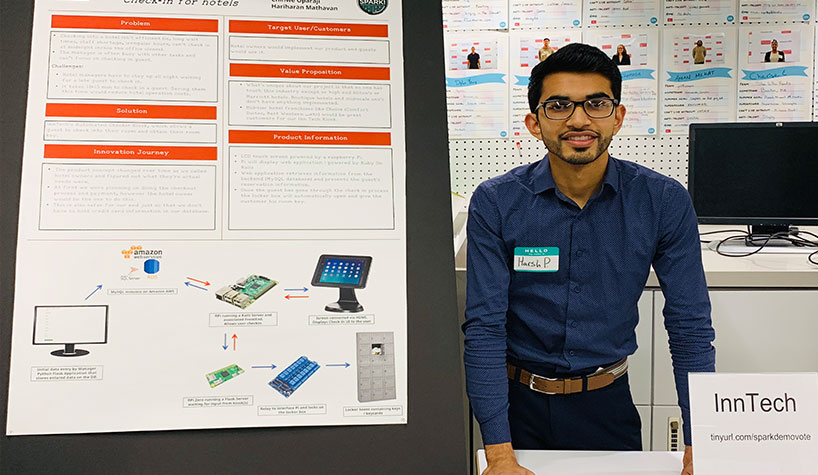BOSTON—Harsh Patel is the founder of InnTech, a platform designed to automate the check-in process for hotels. Much like others in the hospitality industry, he wears many hats—college student, startup inventor and budding businessman.
At two-years-old, Patel’s parents migrated from India to chase the American Dream in the United States. The family operated an independent hotel in Oregon, providing him early and constant exposure to the hospitality industry.
“I grew up behind the front desk,” said Patel. “At age seven, I started to take room reservations and answer phone calls. With a family-run business, everyone learns to pitch in. It may sound crazy, but when you grow up living in a hotel it becomes a daily habit. At age 16, I took on a bigger role as front desk manager at a nearby Best Western. That’s when I was introduced to the franchise world where I quickly learned to operate hotels on a much bigger scale. Soon after, I left to attend Boston University for a degree in computer science.”
With years of on-the-job knowledge of hotels under his belt, Patel is ready to go after his own dreams on the technical side of the hospitality industry.
“Growing up, I watched my parents have to wake up at 3 a.m. to check in a guest,” said Patel. “That’s when I asked myself, ‘What if there was a solution to automate this, so the guest can check into their room at whatever hour?’ Not only would this let the front desk staff focus on other tasks such as answering phone calls, but it would help the night audit staff, who is required to stay up all night to check a few guests in. I know high-end hotels such as Hilton and Marriott have mobile app check-in, but no great solution exists for mid-tier or economy hotels.”
During the fall semester at Boston University, the computer science program—the Spark Innovation Fellows Program—approved his idea to come up with a solution to tackle this issue.
“During the past four to five months, I formed a team with Hariharan Mathavan, a computer engineering student, and Chinwe Oparaji, a design student, to create the InnTech Check-Inn Kiosk,” he said. “InnTech’s vision is to innovate and provide new technology to outdated hotels. We’re here to deliver affordable tech solutions to hotels that don’t have enough power or resources to engineer innovative products themselves. We’re here to disrupt the hotel industry.”
InnTech’s Automated Check-in Kiosk enables a guest to check into their room and obtain a room key. It takes three to five minutes for a guest to check in and obtain their room key, according to Patel. The solution aims to free up front desk staff to focus on other tasks and allow the guest a seamless check-in experience.
With his platform and team in place, Patel shopped InnTech’s automated check-in solution around to various hotel companies and presented the solution at a startup demo day at Boston University for its Spark Entrepreneurship program. “It intrigued a lot of hotel owners,” he said.
The InnTech team will test the product at The Rodeway Inn in Eureka, CA; Redmond Inn in Redmond, OR; and Dreamers Lodge in John Day, OR.
“The feedback has been great,” he said. “Currently we’re having front desk staff enter in guest information into our database, but we’re looking to build a web scraping tool that will automatically take the reservations off the current hotel systems—ChoiceAdvantage or InnSoft, for example—and enter it into our database.”
An added benefit? Patel touts the potential for security, especially during the late-night hours.
“Some hotel owners have told us that this could create additional safety at the hotel,” he said. “For example, someone at night might not be able to rob a hotel if the front door is locked and a guest can only check-in using this kiosk.”
For this trio, there’s much more in the pipeline. Recently, they launched a new product called InnTech Review Your Stay to help hotels boost new, positive reviews on Google, TripAdvisor and Yelp.
“This platform sends a text message to every guest checking out of the hotel, asking them to rate their stay,” he said. “If the guest gives a five-star rating, it automatically takes the guest to Google or TripAdvisor to enable them to review the hotel.”
For ratings below five stars, the platform brings guests to an internal feedback page and solicits feedback for improvement. “Once the guest leaves internal feedback, that message gets sent to the hotel manager’s email inbox,” he said. “This way, the bad review doesn’t get published online—which helps hotels keep their ratings high—and the hotel can resolve the guest’s issue immediately.”
